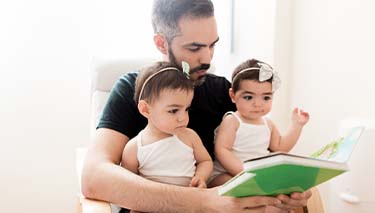Many couples are keen to increase their chances of having twins and want to know what they can do to sway the odds in their favour. After all, there’s no harm in having a little daydream about your own chances of having twins. But then again, the idea of having twins may not appeal to you at all.
We all know we can’t pick our family. But when it comes to conceiving with a set of twins, having a family history of hyper ovulation, releasing more than one egg each month, does certainly help.
Reasons for wanting to increase the chances of having twins
- Maternal age. For women who are starting a family when they are older, there is a tendency to want to have their children quickly.
- The practical side of taking one period of time from work in order to raise a young family.
- Having a family history of twins. If twins are familiar to you and already in your family then you may want to have your own.
- Wanting a big family with siblings who are close in age.
- Simply because the idea appeals to you. For no other reason than the idea of having two babies is just a lovely notion.
What will help boost my chances of having twins?
You’re already increasing your chances if you are a twin yourself or if you have siblings who are twins. If you are lucky enough to come from a family with a pattern of having twins then genetically you are more likely to as well.
So if you, your mother or your maternal grandmother are or were fraternal (non-identical) twins then your chances of having twins may increase to as many as 1 in 7. But if none of these apply to you and you’re keen to have twins, don’t despair.
Within the general population the chances of having twins is about one in every 89 births. Twin numbers have steadily increased since the 1980s. This is due in part, to the number of couples who have had and are having fertility assistance.
Just remember
The chances of having identical or non-fraternal twins is the same for every woman, wherever she lives and no matter what her family history. Identical twinning is random and universal – it is not reliant on two eggs being released but one egg being fertilised by one sperm and then dividing into two. The chances of having identical twins are around 1 in every 285 pregnancies. Around one in every three sets of twins is identical.
Some statistics – just to get you thinking!
- If you are over 45 your chances of having twins increases to around 17%. If you are over 50, your chances will increase yet again to 1 in 9. But you need to by aware that your fertility decreases significantly at this age, and your chances of conceiving at all are much lower.
- Don’t try to have your babies when you are less than 25 years. If you wait until after your 35th birthday then you will more than double your chances in this space of waiting 10 years.
- Women who undergo fertility assistance and take drugs to stimulate their ovaries have more twins. This is because more eggs are released each month and with IVF, generally more than one embryo is put back into the uterus. Because of the improvement in fertility management, the rate of success with embryo transfers has never been better.
- If you are from Nigeria then you are more likely to have twins than a Caucasian woman of the same age. Nigerian women enjoy the highest rate of twin pregnancies in the world. And because their rate is so high, around 1 in every 22 women, the genetic potential to keep twins occurring through the generations will become even more likely.
- If you are overweight then you are more likely to have twins. Perhaps this is nature’s way of guaranteeing that the pregnant mother is able to provide sufficient nutrition to support a twin pregnancy. But women who are overweight or obese often have problems conceiving in the first place. One of the most common recommendations for women who are keen to fall pregnant is to stay within a healthy weight range. A healthy Basal Metabolic Rate (BMR) is 20-25. Women with a BMR of 30 or over tend to have more twins.
- If you are tall, in the top 25th percentile for your height amongst women of the same age, then you are more likely to have twins. Again, this may be attributable to Mother Nature interpreting height (and weight) as a sign of good pregnancy material.
Last Published* May, 2024
*Please note that the published date may not be the same as the date that the content was created and that information above may have changed since.


















